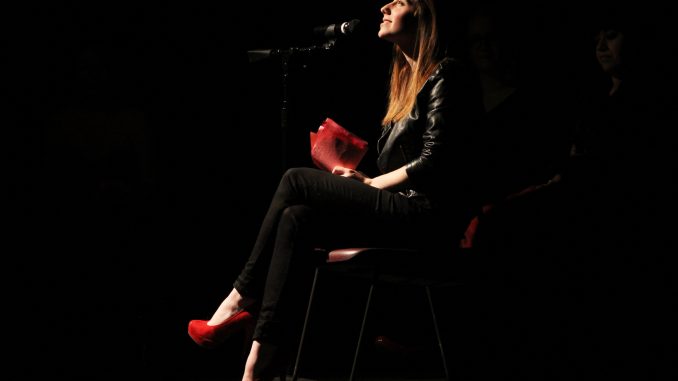
El Faust, a performer in The Vagina Monologues, reads a monologue about a female laywer-turned-sex-worker in “Woman Who Like to Make Women Happy.” | Rob Dirienzo TTN
The first time Alesandra Bevilacqua saw a flier for The Vagina Monologues, she said it spoke to her.
The event is a series of monologues written by Eve Ensler, who conducted various interviews with women, during which she asked them many questions about vaginas. On the weekend of Feb. 12-14, Temple students performed the monologues at the Underground.
“These are real women saying these things,” Bevilacqua, a senior Spanish major said.
Topics covered by the performance included pubic hair, sexual assault and violence, sex work and dangers faced by the transgender community. The audience was told in advance that while some monologues would be funny and lighthearted, others would be serious and perhaps hard to watch.
“Anyone who identifies as a woman is welcome on stage,” said Kate Schaeffer, the producer of The Vagina Monologues and health educator at the Wellness Resource Center.
Schaeffer has helped to produce the event at Temple since 2009 and said that nearly every year she has been a part of the show, it has sold out or come close to selling out.
Profits raised by The Vagina Monologues have always benefited organizations that aid women, Schaeffer said. This year, collected profits will go toward Take Back the Night, an organization that “is a beacon of light for millions” of women who have been sexually or domestically abused.
This April, Temple will be participating in Take Back the Night to demonstrate support for survivors of abuse.
V-Day, a movement inspired by The Vagina Monologues, strives to end violence against girls and women, and Schaeffer said women are suggested to hold the performances in February.
“[February] encompasses high-volume awareness times,” Schaeffer said.
Members of the cast said some students have expressed discomfort surrounding themes of the monologue or even the use of the word “vagina.” The cast feels that it is important to discuss topics covered in The Vagina Monologues and that everyone, men included, can learn from them.
“It is important for everyone to be conscious of women’s issues in a way that makes everyone feel comfortable,” Jamie Swanton said.
Swanton, a senior social work major and women’s studies minor, said The Vagina Monologues are a way for her to involve herself with issues she feels are important. Swanton said she is a survivor of sexual violence, and that her experience with The Vagina Monologues has given her an opportunity to share her experiences with others who understand how she feels.
“I’m a feminist, so I really involve myself in the feminist movement in Philadelphia,” Swanton said.
The performance, held on Feb. 12, filled almost all seats in the Underground in the lower level of the Student Center. Students laughed at jokes cast members made, like the comical retelling of a sex worker’s experience with other women, but also held a respectful silence during difficult stories, like the retelling of a transgender woman’s experience of losing her boyfriend through violence.
As the cast members took their bows, the crowd applauded loudly and many gave them a standing ovation.
“It was a moment, for me, that really released a lot of stuff that I was holding onto,” Swanton said.
Bevilacqua said it is important to her that the money raised through the event goes directly to support other women who have survived assault or abuse.
“There are hardships you’ll probably never face and hardships you’ll face every day as a woman,” she said.
Vince Bellino can be reached at vince.bellino@temple.edu
CORRECTION: In a version of this article that appeared in print, Alesandra Bevilacqua was misidentified as a survivor of sexual assault. The Temple News regrets the error.




Be the first to comment